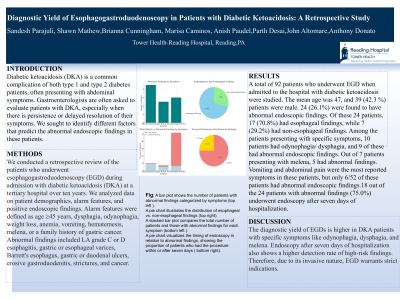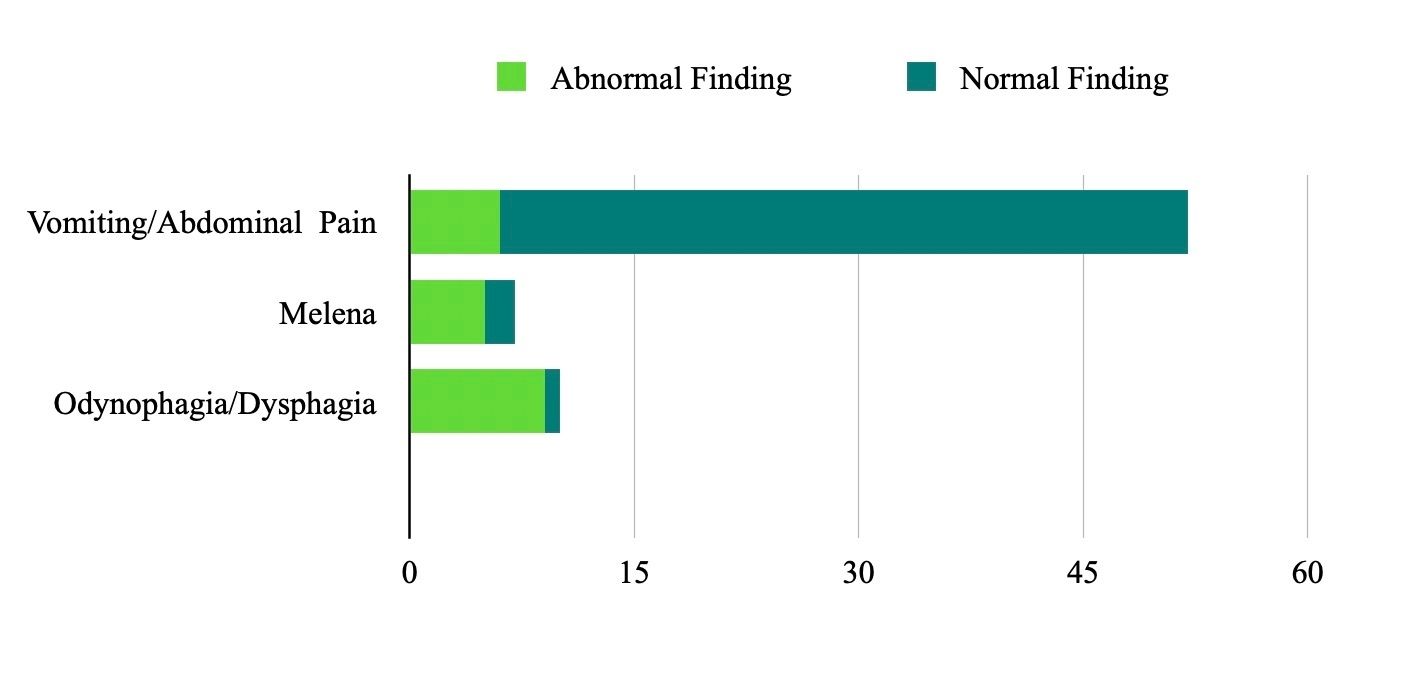Monday Poster Session
Category: Biliary/Pancreas
P1731 - Diagnostic Yield of Esophagogastroduodenoscopy in Patients with Diabetic Ketoacidosis: A Retrospective Study
Monday, October 28, 2024
10:30 AM - 4:00 PM ET
Location: Exhibit Hall E

Has Audio
- SP
Sandesh R. Parajuli, MD
Reading Hospital - Tower Health
Reading, PA
Presenting Author(s)
Sandesh Parajuli, MD1, Shawn Mathew, DO1, Brianna Cunningham, DO1, Marisa Caminos, DO1, Parth Desai, DO2, Anish Paudel, MD3, John Altomare, MD1, Anthony Donato, MD2
1Reading Hospital - Tower Health, Reading, PA; 2Reading Tower Health, Reading, PA; 3Reading Hospital - Tower Health, Wyomissing, PA
Introduction: Diabetic ketoacidosis (DKA) is a common complication of both type 1 and type 2 diabetes patients, often presenting with abdominal symptoms. Gastroenterologists are often asked to evaluate patients with DKA, especially when there is persistence or delayed resolution of their symptoms. We sought to identify different factors that predict the abnormal endoscopic findings in these patients.
Methods: We conducted a retrospective review of the patients who underwent esophagogastroduodenoscopy (EGD) during admission with diabetic ketoacidosis (DKA) at a tertiary hospital over ten years. We analyzed data on patient demographics, alarm features, and positive endoscopic findings. Alarm features were defined as age ≥45 years, dysphagia, odynophagia, weight loss, anemia, vomiting, hematemesis, melena, or a family history of gastric cancer. Abnormal findings included esophagitis, gastric or esophageal varices, Barrett's esophagus, gastric or duodenal ulcers, erosive gastroduodenitis, strictures, and cancer.
Results: A total of 92 patients who underwent EGD when admitted to the hospital with diabetic ketoacidosis were studied. The mean age was 47, and 39 (42.3 %) patients were male. 24 (26.1%) were found to have abnormal endoscopic findings. Of these 24 patients, 17 (70.8%) had esophageal findings, while 7 (29.2%) had non-esophageal findings. Among the patients presenting with specific symptoms, 10 patients had odynophagia/ dysphagia, and 9 of these had abnormal endoscopic findings. Out of 7 patients presenting with melena, 5 had abnormal findings. Vomiting and abdominal pain were the most reported symptoms in these patients, but only 6/52 of these patients had abnormal endoscopic findings.18 out of the 24 patients with abnormal findings (75.0%) underwent endoscopy after seven days of hospitalization.
Discussion: The diagnostic yield of EGDs is higher in DKA patients with specific symptoms like odynophagia, dysphagia, and melena. Endoscopy after seven days of hospitalization also shows a higher detection rate of high-risk findings. Therefore, due to its invasive nature, EGD warrants strict indications.

Disclosures:
Sandesh Parajuli, MD1, Shawn Mathew, DO1, Brianna Cunningham, DO1, Marisa Caminos, DO1, Parth Desai, DO2, Anish Paudel, MD3, John Altomare, MD1, Anthony Donato, MD2. P1731 - Diagnostic Yield of Esophagogastroduodenoscopy in Patients with Diabetic Ketoacidosis: A Retrospective Study, ACG 2024 Annual Scientific Meeting Abstracts. Philadelphia, PA: American College of Gastroenterology.
1Reading Hospital - Tower Health, Reading, PA; 2Reading Tower Health, Reading, PA; 3Reading Hospital - Tower Health, Wyomissing, PA
Introduction: Diabetic ketoacidosis (DKA) is a common complication of both type 1 and type 2 diabetes patients, often presenting with abdominal symptoms. Gastroenterologists are often asked to evaluate patients with DKA, especially when there is persistence or delayed resolution of their symptoms. We sought to identify different factors that predict the abnormal endoscopic findings in these patients.
Methods: We conducted a retrospective review of the patients who underwent esophagogastroduodenoscopy (EGD) during admission with diabetic ketoacidosis (DKA) at a tertiary hospital over ten years. We analyzed data on patient demographics, alarm features, and positive endoscopic findings. Alarm features were defined as age ≥45 years, dysphagia, odynophagia, weight loss, anemia, vomiting, hematemesis, melena, or a family history of gastric cancer. Abnormal findings included esophagitis, gastric or esophageal varices, Barrett's esophagus, gastric or duodenal ulcers, erosive gastroduodenitis, strictures, and cancer.
Results: A total of 92 patients who underwent EGD when admitted to the hospital with diabetic ketoacidosis were studied. The mean age was 47, and 39 (42.3 %) patients were male. 24 (26.1%) were found to have abnormal endoscopic findings. Of these 24 patients, 17 (70.8%) had esophageal findings, while 7 (29.2%) had non-esophageal findings. Among the patients presenting with specific symptoms, 10 patients had odynophagia/ dysphagia, and 9 of these had abnormal endoscopic findings. Out of 7 patients presenting with melena, 5 had abnormal findings. Vomiting and abdominal pain were the most reported symptoms in these patients, but only 6/52 of these patients had abnormal endoscopic findings.18 out of the 24 patients with abnormal findings (75.0%) underwent endoscopy after seven days of hospitalization.
Discussion: The diagnostic yield of EGDs is higher in DKA patients with specific symptoms like odynophagia, dysphagia, and melena. Endoscopy after seven days of hospitalization also shows a higher detection rate of high-risk findings. Therefore, due to its invasive nature, EGD warrants strict indications.

Figure: Endoscopy Findings Based on Symptoms.
Disclosures:
Sandesh Parajuli indicated no relevant financial relationships.
Shawn Mathew indicated no relevant financial relationships.
Brianna Cunningham indicated no relevant financial relationships.
Marisa Caminos indicated no relevant financial relationships.
Parth Desai indicated no relevant financial relationships.
Anish Paudel indicated no relevant financial relationships.
John Altomare indicated no relevant financial relationships.
Anthony Donato indicated no relevant financial relationships.
Sandesh Parajuli, MD1, Shawn Mathew, DO1, Brianna Cunningham, DO1, Marisa Caminos, DO1, Parth Desai, DO2, Anish Paudel, MD3, John Altomare, MD1, Anthony Donato, MD2. P1731 - Diagnostic Yield of Esophagogastroduodenoscopy in Patients with Diabetic Ketoacidosis: A Retrospective Study, ACG 2024 Annual Scientific Meeting Abstracts. Philadelphia, PA: American College of Gastroenterology.
